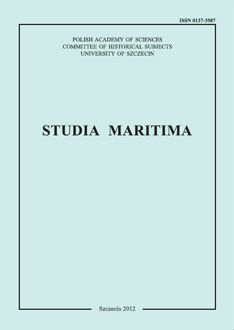Anfänge des Konsulardienstes skandinavischer Staaten in Stettin nach dem Zweiten Weltkrieg
The beginnings of the Scandinavian consular service in the post-WW II
Author(s): Ryszard TechmanSubject(s): History
Published by: Wydawnictwo Naukowe Uniwersytetu Szczecińskiego
Keywords:
Summary/Abstract: For the Scandinavians who could boast both of extended shipping fleet and lively commodity turnover by sea, the significance of the institution of consul was particularly great. As a rule, they established their external agencies in big port centres so as to control navigation and trade matters. One of such ports was Szczecin where in the 20th century interwar period the consulates of Denmark, Sweden, Finland and Norway were situated. After WWII only the agencies of the Ministry of Foreign Affairs in Stockholm and Helsinki were recreated in the city on the River Oder, whereas those representing Oslo and Copenhagen resolved to be set in Gdansk and Gdynia. The article aims at analyzing the reasons for the post-1945 establishment, organization, and activity of the Swedish Consular Agency and the Consulate of Finland in Szczecin. It also attempts at presenting the profiles of the representatives of both of the states in question, namely, the Swede Arne Lellki and the Finnish Santerii Jacobsson. These men's priority as consuls were: navigation traffic and the resulting necessity to take care both of Scandinavian sailors and units sailing under the Swedish and Finnish flags. Such priorities seem understandable, for in the 1940s Scandinavian merchant vessels constituted a majority of all ships to be found in the port of Szczecin, with crews of these ships causing trouble in town once they go ashore.
Journal: Studia Maritima
- Issue Year: 26/2013
- Issue No: 1
- Page Range: 107-133
- Page Count: 27
- Language: German

